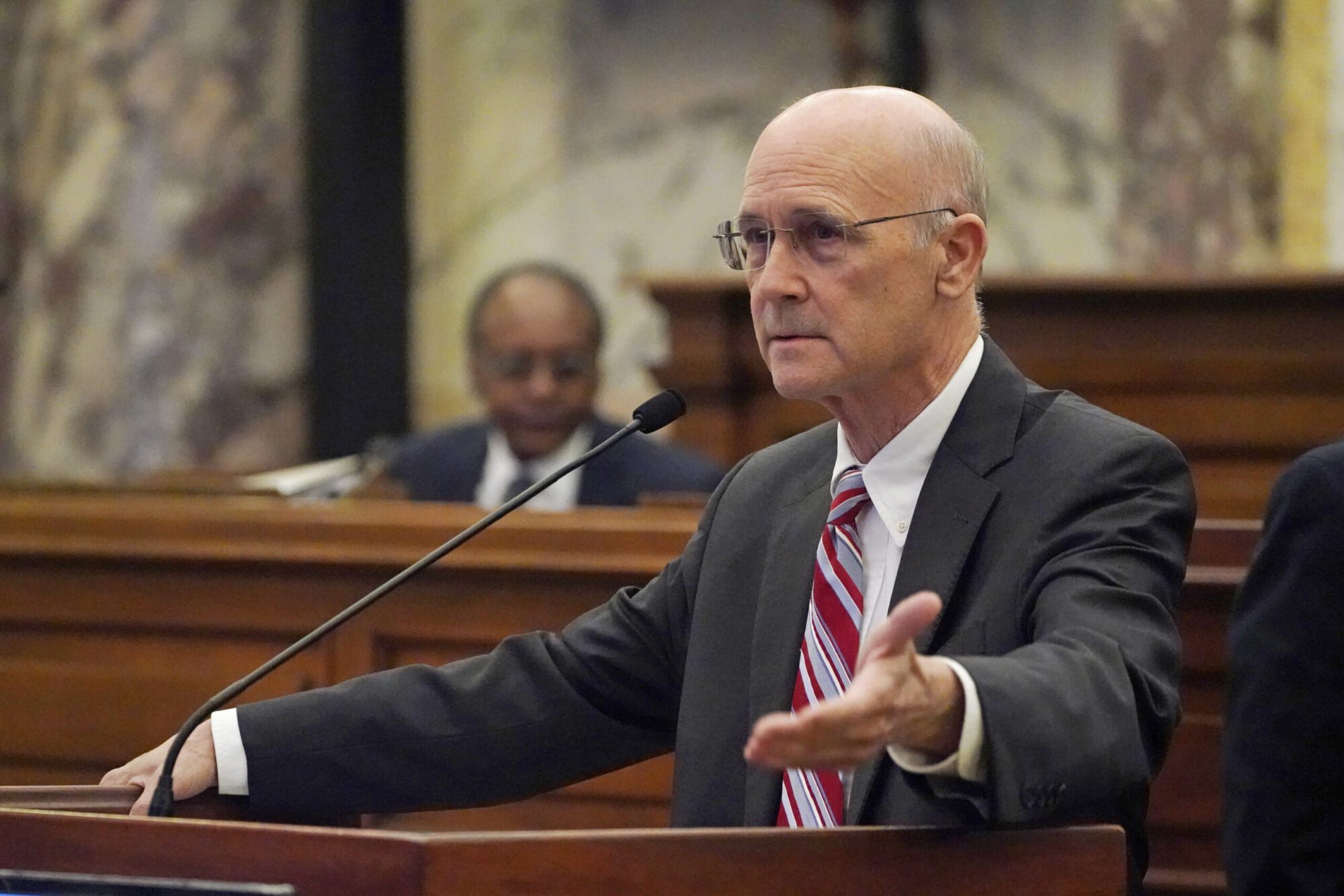
Sen. Hob Bryan, D-Amory, speaks at the Mississippi Capitol in Jackson, on Tuesday, March 7, 2023, about a bill that would set new rules for removing names from voter rolls. (AP Photo/Rogelio V. Solis)
The bill would require each county and municipal law enforcement agency to provide Mental Health First Aid training and employ a Crisis Intervention Team Officer.
The Mississippi Senate has passed the Mississippi Collaborative Response to Mental Health Act (H.B. 1222), moving it one step closer towards final passage.
Authored by State Representative Sam Creekmore (R), House Bill 1222 seeks to improve the quality of mental health care in the state of Mississippi.
State Senator Hob Bryan (D), Chairman of the Senate Public Health and Welfare Committee, said the House has done a great deal of work on the bill.
“This is not going to solve all of the problems, but it will move the ball down the field,” the chairman said.
Senator Bryan offered a substitute amendment for the committee amendment and said it was “non-controversial.”
“There were minor concerns expressed about some of the provisions of the bill as it passed the House and as it came out of committee. The substitute resolves those matters,” Bryan said. “I think that what we have is a bill before us which will accomplish a great deal and should not run afoul with any concerns that were expressed.”
Click here to read more about the bill.
As passed in the Senate on Wednesday, the legislation would require each county and municipal law enforcement agency to provide Mental Health First Aid training that is evidence-based and approved by the Department of Mental Health to all law enforcement officers who are employed or contracted by the agency by July 1, 2031.
“That’s a long enough period of time to allow there to be sufficient training, but if you’ll think about a number of the interactions around the country between individuals and the police that have unfortunate consequences, many of those deal with individuals who have mental issues. They encounter someone on a police force that isn’t trained, doesn’t know how to recognize these situations and quite frankly, I believe, get scared,” Senator Bryan said.
The Senate Public Health and Welfare Chairman said this training would go a long way in avoiding unfortunate interactions and producing better outcomes for the police and those who are mentally ill.
Additionally, the legislation states that, “On or before July 1, 2025, each county and municipal law enforcement agency shall employ at least one (1) law enforcement officer who is a Crisis Intervention Team Officer, as defined in Section 41-21-131. An agency which employs fewer than five (5) law enforcement officers may execute an agreement with one or more other law enforcement agencies to have a Crisis Intervention Team officer to serve as the officer for that agency.”
Senator Bryan explained that it is common for individuals who are at their “wits’ end” with family members struggling with mental health to go to the Chancery Clerk, which historically has tended to get the legal system involved.
Bryan said that there has been a suggestion to have an individual at the community mental health center assigned to each county go to the Chancery Clerk office when the family is there, sit down with the family, and talk through options other than an involuntary commitment.
“This allows to have more of these court liaisons if funding is made available,” Bryan said.
Currently, members of the State Board of Mental Health can be reappointed to multiple consecutive terms. The bill would require a member to sit out for at least a year after serving two consecutive terms.
Bryan explained that there have been difficulties with accounting in many community mental health centers. This bill would require the centers to employ an accountant to keep the books through the year and a CPA to review the books at the end of the year.
Senator Bryan said there is also a reporting requirement so the state will know in real-time who is being admitted to an institution for care and who is being denied because of unavailability of beds. He said this is in an effort to try to focus resources where they are needed most.
Bryan also explained that the bill sets up a fund that through appropriations the community mental health centers will be able to provide crisis intervention teams and additional housing options for those who are mentally ill.











